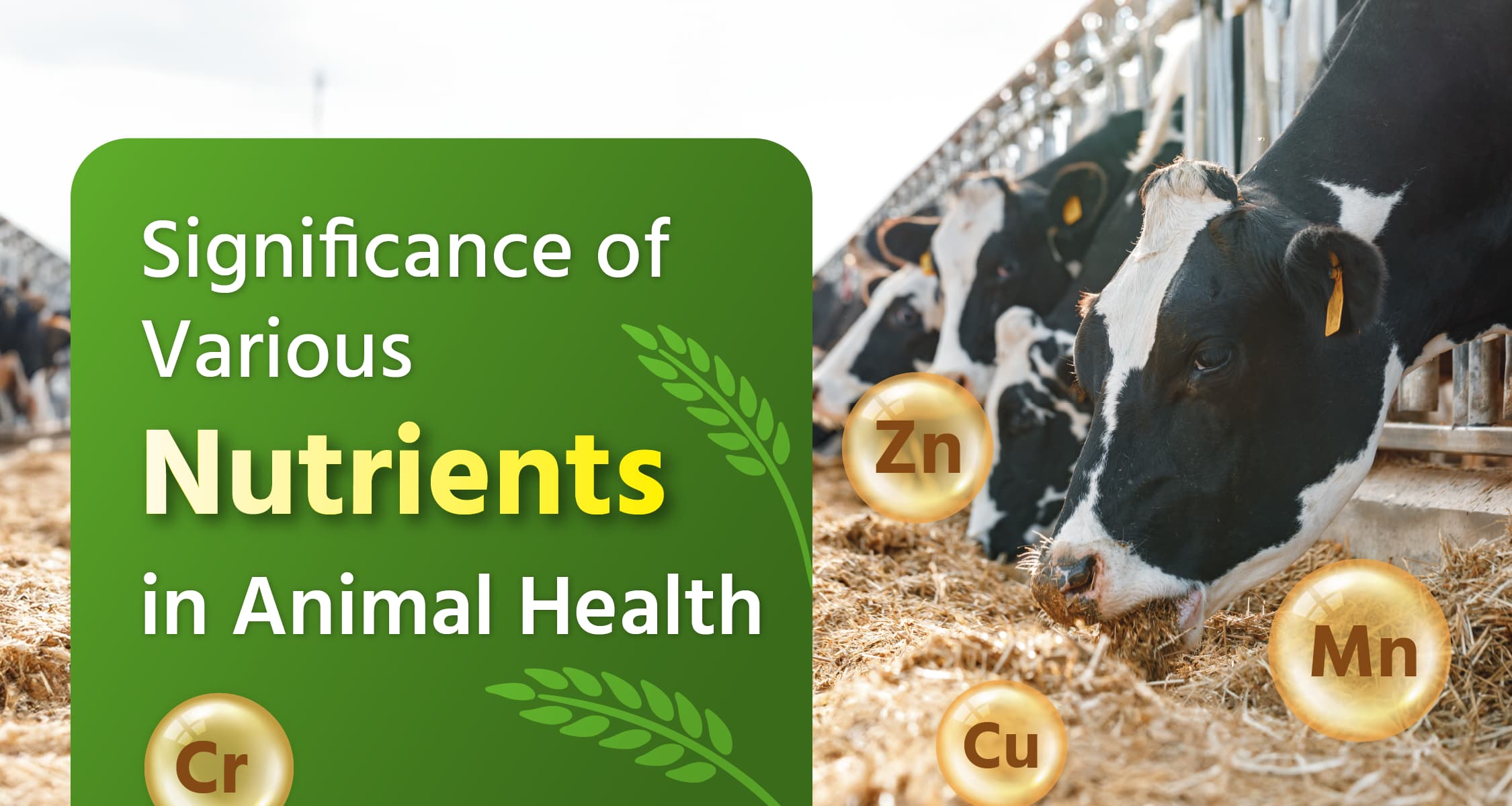पोस्ट विवरण
Importance of Various Nutrients in Animals

Just like humans, minerals and vitamins are essential for the well-being of animals too. Calcium, potassium, phosphorus, magnesium, and iron, among others, are necessary for their physical development. Sometimes, the symptoms of mineral deficiency may not be immediately noticeable, or a lack of awareness about these symptoms can lead to a delay in providing the required supplements to livestock. This can adversely affect their health. Through this post, we will go through detailed information about the issues caused by the deficiency of some important minerals in farm animals.
Addressing and Overcoming Problems Caused by Various Nutrient Deficiencies in Animals
Problems due to Calcium Deficiency in Animals
- Deficiency in calcium leads to reduced milk production capacity.
- Weakening of teeth and bones in farm animals causes difficulties in standing or walking.
- Increased risk of fractures and bone deformities.
- Hindrance in the physical development of newborn animals.
- Increased susceptibility to milk fever in animals.
- Animals may start chewing on materials like soil, ropes, cloth, etc., in case of calcium deficiency.
Overcoming Calcium Deficiency in Animals
- To address calcium deficiency in adult animals, include 100 ml of DeHaat Vetnocal Gold in their daily diet.
- For newborn animals, administer 20 ml of DeHaat Vetnocal Gold twice daily.
Problems due to Phosphorus Deficiency in Animals
- A deficiency of phosphorus in the bodies of animals weakens their teeth and bones.
- It can lead to swelling in their joints
- Sometimes blood also starts coming out along with their urine.
- Animals may appear lethargic due to lack of energy.
- Animals may experience difficulty in digestion.
- They might start limping.
- Their reproductive maturity may be delayed.
- Irregularities in the estrous cycle are also possible.
- The reproductive capacity of animals is also affected.
Overcoming Phosphorus Deficiency in Animals
- To address phosphorus deficiency in animals, include grains such as barley, oats, mustard, rapeseed, peanuts, etc., in their diet as part of green fodder.
- Additionally, ensure the inclusion of bran in their diet.
- Feeding DeHaat Vetnocal Gold also fulfills the phosphorus deficiency along with calcium in animals.
Problems due to Potassium Deficiency in Animals
- Potassium deficiency slows down the physical development of animals.
- Dairy animals experience reduced milk production capacity.
- Weight loss and lethargy become evident, with weakened muscles.
- Animals may suffer from stiffness.
- Reduced intake of food and water occurs due to potassium deficiency, complicating the intake of other nutrients.
- Additionally, digestive disorders like acidosis may arise.
Overcoming Potassium Deficiency in Animals
- Ensure a balanced diet for animals.
- DeHaat Vetnocal Gold also contains potassium. Its consumption is highly beneficial for animals.
- Include 50 gm of DeHaat Doodh Plus in the daily diet of cows and buffaloes.
- Include 20 gm of DeHaat Doodh Plus in the daily diet of newborn animals, sheep, and goats.
Problems due to Copper Deficiency in Animals
- Bone weakening due to lack of copper.
- Decreased weight in animals.
- Slow physical development in animals.
- Reduced immune resistance in animals.
- Increased risk of mastitis in animals.
- Fear of the placenta getting stuck.
- Copper is essential for the breakdown of enzymes and iron in animal bodies. Therefore, a deficiency of copper can also lead to symptoms of anemia in animals.
- The color of the hair on the animals' bodies begins to change. Hair color changes from black to brown or red.
- Weakness and decreased activity in the uterus (uterine tissues) of female animals.
- Increasing copper deficiency can lead to fetal death or miscarriage in the early stages of pregnancy.
Overcoming Copper Deficiency in Animals
- To address copper deficiency in animals, include a balanced amount of green fodder and dry fodder in their diet.
- To increase milk production, include DeHaat Doodh Plus in the animals' diet.
- Currently, various types of feed supplements are available in the market. Ensure to include them in the animals' diet.
Do you feed your animals with balanced feed supplements? Share your answer with us through comments. For more information related to animal health and nutrition, follow the 'Pashu Gyan' channel now. Also, don't forget to like and share this post to spread this information to other farmers.
Frequently Asked Questions (FAQs)
Q: How many elements are mainly found in animal feed?
A: Animal feed generally contains carbohydrates, protein, fat, fiber, minerals, and vitamins. These micronutrients play a vital role in the physical development of animals, as well as in enhancing milk production capacity.
Q: How important are minerals for animals?
A: Minerals are essential for the physical development of animals, structure, and strength of teeth and bones, improvement in reproductive capacity, increased milk production, and maintaining resistance to diseases.
Q: What should be fed to increase milk production?
A: To increase milk production, feed animals high-quality fodder in large quantities, provide supplementary feed for minerals and vitamins, and ensure access to clean water for drinking.
जारी रखने के लिए कृपया लॉगिन करें

फसल चिकित्सक से मुफ़्त सलाह पाएँ
